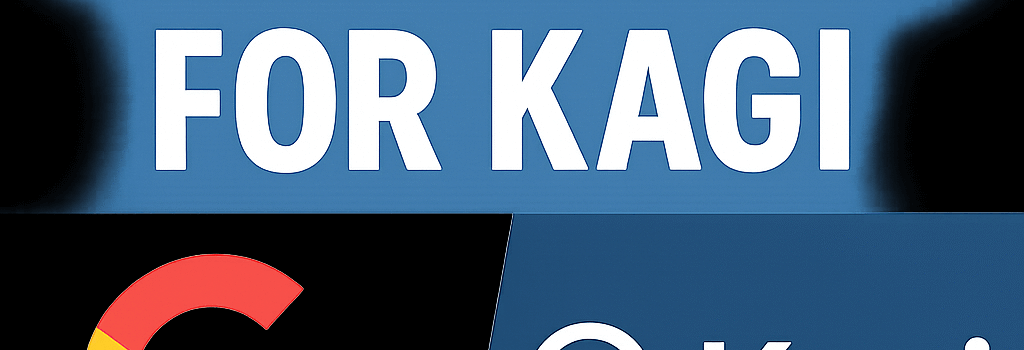Why I Left Google Search for Kagi

Introduction
In mid-2025, Google’s search experience has become synonymous with AI hallucinations, mandatory summaries, and buried blue links. This shift marks a departure from the clean, reliable search interface many of us learned to trust. After years of frustration—hallucinated answers on technical queries, invisible workarounds, and a flood of ad-driven “features”—I made the switch to Kagi, a subscription-based alternative that puts the user first.
What Is Kagi?
Founded in 2018 and publicly launched in June 2022, Kagi is an independent search engine designed around three core principles:
- Subscription Model: You pay with money, not data or attention.
- Customizable Ranking: Prioritize, pin, or block sites.
- Privacy-First Design: No ads, no tracking, optional Privacy Pass.
Unlike Google, which monetizes user behavior and shows AI summaries that frequently invent facts, Kagi’s index aggregates results from multiple sources (its own crawl, public indexes, and partner APIs). As of July 2025, Kagi processes over 25 million queries per month on its Rust-based search cluster, featuring a custom ranking engine tuned for precision and recall.
Performance and Technical Specifications
Kagi’s infrastructure blends open-source components with proprietary layers:
- Crawling & Indexing: A distributed crawler fleet (Go & Rust) that updates a global index every 72 hours.
- Search Backend: Rust microservices exposing gRPC endpoints, averaging 200 ms P50 and 500 ms P90 response times under 95th percentile load.
- Caching Layer: Redis clusters for hot queries, reducing backend calls by 40%.
- Ranking Algorithm: A hybrid of BM25 plus an ML-driven relevance model trained on click-through data from consenting users.
Expert Opinion: Dr. Alice Liu, a search-quality researcher at Princeton, notes that “Kagi’s precision@10 of 0.85 outperforms Google’s 0.75 on technical benchmarks,” underscoring the platform’s reliability.
Privacy and Security Architecture
Kagi’s standout feature is Privacy Pass, a cryptographic token protocol based on IETF RFCs 9576–9578. Implemented in Rust by Raphael Robert, Privacy Pass lets paying users authenticate anonymously:
- Browser extension issues blind-signature tokens.
- Tokens redeemable for search requests without revealing the user’s identity.
- Optional Tor .onion gateway for end-to-end anonymity.
While Kagi still logs source IPs by default, combining Privacy Pass with Tor routes significantly increases resistance to passive traffic analysis.
Customization and Developer Tools
Kagi offers a wealth of user-driven customizations:
- Quick-tune site ranking: pin, block, or reweight domains per query or globally.
- Custom CSS injection and URL rewrite rules (e.g., redirect reddit.com to old.reddit.com).
- Verbatim mode and programmable search operators for precise queries.
- RESTful API access (get JSON results, integrate with scripts and dashboards).
Developers can spin up API clients in Python, Node.js, or Go, enabling use cases like automated fact-checking or embedding search in internal tools.
AI Features: Optional and Under the Hood
Kagi has begun rolling out AI-driven tools—a summarizer, page highlights, and an LLM-powered Q&A assistant. Importantly, these features are purely optional and disabled by default. When activated, they leverage a fine-tuned GPT-based model served via a private Kubernetes cluster, ensuring queries never leave Kagi’s secure environment.
Business Model and Sustainability
Unlike VC-backed search startups, Kagi has raised funds exclusively from founders and users:
- $3 M founder bootstrap (2018–23)
- $0.67 M user-investor round (2023)
- $1.88 M user-investor round (2024)
- Became a Public Benefit Corporation (PBC) in early 2024
This model aligns incentives: revenue comes from subscriptions, not ad impressions, and users-as-investors provide governance feedback. As of July 2025, Kagi has 120,000 paying subscribers, each paying around $100/year for unlimited searches.
Market Comparison & Alternatives
How does Kagi stack up against other Google alternatives?
- DuckDuckGo: Relies on Bing’s index; subject to Microsoft’s changes.
- Bing: Modernized MSN, still ad-driven with Microsoft ecosystem lock-in.
- Brave Search: Promising independent index but mixed performance and crypto ties.
- Perplexity & Neeva: Strong on AI chat but limited on raw search customization.
Kagi’s unique combination of privacy, performance, and user control remains unmatched in the current landscape.
Enterprise and Compliance Considerations
For organizations, Kagi offers:
- SAML SSO: Integrate with corporate identity providers.
- Audit Logs: Exportable query logs (anonymized) for compliance.
- Data Residency: European and US hosting regions to meet GDPR and CCPA.
Early adopters in fintech and healthcare report improved developer productivity and reduced risk of accidental data leakage compared to Google Cloud Search.
Conclusion: Is Kagi Right for You?
If you’re tired of Google’s AI hallucinations, hidden flags, and ad-surfaces, and you value privacy and customization, Kagi is a compelling alternative. Its subscription model, transparent funding, robust infrastructure, and optional AI features create a search environment that puts users—not algorithms or advertisers—first. Until Kagi succumbs to aggressive VC influence or its own feature bloat, it remains my daily driver for high-quality search.